Nerine Dorman's Blog, page 92
October 8, 2012
AfroSF with Ivor W Hartmann #guest
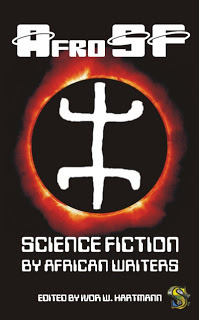 I've got Ivor W Hartmann, editor of an upcoming SF anthology, stopping by my blog today for a little Q&A. Welcome Ivor. Tell us a little more about your anthology. How did you go about pulling it together?
I've got Ivor W Hartmann, editor of an upcoming SF anthology, stopping by my blog today for a little Q&A. Welcome Ivor. Tell us a little more about your anthology. How did you go about pulling it together?
The AfroSF: Science Fiction by African Writers anthology has been a dream of mine for five years. In 2007, I returned to writing after sixteen years armed with serious intent. The first story I wrote (or I should say completed rather) was Earth Rise, a Science Fiction short story. As soon as I looked for somewhere to publish it, preferably an African publication, the harsh realities of African publishing, and publishing for African writers in general, in 2007, became quite apparent. Including the fact, a pan-African anthology of Science Fiction by African writers only had never been published, and thus the dream of AfroSF was conceived.
Long story short, I created the micro-press StoryTime that first published StoryTime: a weekly African literature online magazine, from June 2007 to June 2012. In 2010, StoryTime launched African Roar, an annual multi-genre anthology of African writers, co-edited by Emmanuel Sigauke and I that’s now in its third year. So, by late 2011, I felt the time had come to pursue the AfroSF dream.
If one looks at the last 50 years of publishing in terms of SciFi and African writers, some real gems have never been collected into one volume. Thus, the temptation to have a mix of reprints and original works was very strong (and a lot easier in terms of editing), but the vision I had for AfroSF needed to include the forward thinking spirit embodied so well in SciFi as a genre. Therefore, in December 2011, I put out the call for submissions for original (unpublished) works only.
The first story I received for the anthology was from great and wonderful Nnedi Okorafor, which for me kind of set standard for all submissions that followed — fifty-two in total, so not a lot, but more than I had hoped for and a great start for a first anthology. In this, Lauren Beukes was also of great help when she put the word out on the subs call, and suggested a few South African writers who might be interested.
A word on the selections and editing process I employ. As with the StoryTime magazine and the African Roar's, when I read the AfroSF submissions I was looking for great themes and new ideas well expressed, in this case in the SciFi genre. This is to say, ideas and themes trumped imperfect prose, which I knew from experience could be dealt with in edits — depending on how much time the editor and writer can devote to the editing process. Now, this approach doesn't always work, but what it does do is give writers whose work I selected the chance to work on at least one edit of their story with an editor, and I could see how it went from there.
Although I had StoryTime on hand to publish it, in terms of this anthology being a first and such I did seek bigger publishers who could get it out there in a much bigger way than I can. So, as soon as I had a rough unedited first draft I sent it out and about and did get some interest from a few publishers — which was a good sign for anthology as a whole. However, in the end no one came to the party in any serious way, so I returned to the original plan of publishing it though StoryTime — first as an eBook that will then fund a POD print edition with its sales, this being a realistic, micro-press publishing model I have used with the African Roar anthologies and I know works. However, specific country rights for the anthology will remain open for negotiation and translations, etc., if it does garner any serious interest after the first edition eBook release.
Who's all in it, and what are some of the stories that jump out if you want to tell potential readers more about what to expect?
The confirmed Table of Contents for AfroSF is:
Moom! Nnedi Okorafor
Home Affairs Sarah Lotz
Five Sets of Hands Cristy Zinn
New Mzansi Ashley Jacobs
Azania Nick Wood
Notes from Gethsemane Tade Thompson
Planet X S.A. Partridge
The Gift of Touch Chinelo Onwualu
The Foreigner Uko Bendi Udo
Angel Song Dave de Burgh
The Rare Earth Biram Mboob
Terms & Conditions Apply Sally-Ann Murray
Heresy Mandisi Nkomo
Closing Time Liam Kruger
Masquerade Stories Chiagozie Fred Nwonwu
The Trial Joan De La Haye
Brandy City Mia Arderne
Ofe! Rafeeat Aliyu
Claws and Savages Martin Stokes
To Gaze at the Sun Clifton Gachagua
Proposition 23 (Novelette) Efe Okogu
You know, when you work with writers on stories for an anthology all the way from selection to a final, it becomes hard to have favourites. Each story had something in it that appealed to me initially as a lifelong avid SciFi reader, which was then developed further in edits (where required). So they all became very close to my heart, like having a big extended family.
The AfroSF stories have a bit of everything in the realm of SciFi, from Comic, Military, Hard, Soft, to Apocalyptic, Space Opera, Cyberpunk, Biopunk, Aliens, and even Time Travel, and more, and fairly liberal mixings thereof. The stories represent a diversity of voices and themes specifically rooted in the SciFi genre, from some stellar established and upcoming African writers.
What was your aim in putting the call out for the stories?
To start with, SciFi, like most fiction genres that aren’t Contemporary, except perhaps Romance and Crime to an extent, is highly underdeveloped in African literature as a whole. Now I could go into all the reasons why, but let’s look to the future instead.
SciFi is the only genre that enables African writers to envision a future from our African perspective. Moreover, it does this in a way that is not purely academic and so provides a vision that is readily understandable through a fictional context. The value of this envisioning for any third-world country, or in our case continent, cannot be overstated, nor negated. Science Fiction helps drive social and technological change. If you can’t see and relay an understandable vision of the future, your future will be co-opted by someone else’s vision, one that will not necessarily have your best interests at heart, at all. Thus, Science Fiction by African writers is of paramount importance to the development and future of our continent.
These were the main aims in taking a leap of faith and putting out a call to all African writers across the continent and abroad for this anthology.
Where can folks find the anthology?
AfroSF will hit all the Amazon sites in an eBook edition first in December 2012. Then, depending on sales to fund it, we will release a POD print edition later to Amazon, Barnes & Noble, etc. It will also be signed up to Paperight, a fantastic new company that can turn any photocopy shop worldwide (and especially in Africa) into a budget books printer and seller. So in essence, AfroSF is not only a SciFi anthology in content but in its publishing and distribution too.
BIO
 Ivor W Hartmann, Zimbabwean writer, editor, publisher, visual artist, and author of Mr. Goop (Vivlia, 2010). Nominated for the UMA Award (Earth Rise, 2009), awarded The Golden Baobab Prize (Mr. Goop, 2009), and finalist for The Yvonne Vera Award (A Mouse amongst Men, 2011). His writing has appeared in African Writing Magazine, Wordsetc, Munyori Literary Journal, Something Wicked, The Apex Book of World SF V2, and other publications. He runs the StoryTime micro-press, publisher of the African Roar annual anthologies and AfroSF, and is on the advisory board of Writers International Network Zimbabwe.
Ivor W Hartmann, Zimbabwean writer, editor, publisher, visual artist, and author of Mr. Goop (Vivlia, 2010). Nominated for the UMA Award (Earth Rise, 2009), awarded The Golden Baobab Prize (Mr. Goop, 2009), and finalist for The Yvonne Vera Award (A Mouse amongst Men, 2011). His writing has appeared in African Writing Magazine, Wordsetc, Munyori Literary Journal, Something Wicked, The Apex Book of World SF V2, and other publications. He runs the StoryTime micro-press, publisher of the African Roar annual anthologies and AfroSF, and is on the advisory board of Writers International Network Zimbabwe.
Published on October 08, 2012 14:08
October 3, 2012
Wuthering Heights by Emily Bronte #review
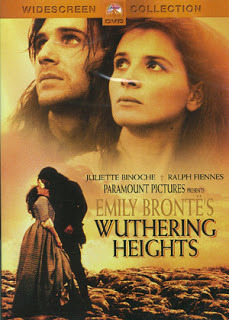 Ralph Fiennes will always be my Heathcliff
Ralph Fiennes will always be my HeathcliffI first read Wuthering Heights by Emily Brontë at the tender age of fourteen, and remember quite clearly that it was my birthday, and my mom and dad took me out to the movies. One glance at the poster and I declared we’d go watch Wuthering Heights starring Ralph Fiennes and Juliette Binoche, and that was that. I was transported by the thwarted romance that played out on the bleak Yorkshire moors. Of course I had to go read the book straight after, and while my youthful self probably didn’t “get” half the relationship dynamics or the full depth of the dialogue, I nonetheless knew this is a book I’d need to reread at some point.
Fast forward 20 years (gee whizz, it’s been *that* long) and I downloaded the book from Gutenberg.org – a far cry from the battered paperback copy I inherited from the family home, and was immediately transported – again.
Wuthering Heights is primarily a story about relationships, and of people who willfully twist and allow others to twist them. We are first introduced to our narrator, a chap by the name of Lockwood, who has rented the grand Thrushcross Grange (complete with its own park lands). I get the idea the chap is a bit of a poseur, who’s quite oblivious and gauche when it comes to how he relates to people. Self-absorbed. I missed this in the first read. Kudos to Brontë for having a narrator I’d cheerfully slap. I mean, the fool goes blundering in to visit the inhabitants of Wuthering Heights when it’s perfectly clear to anyone else with half an ounce of common sense that they do not appreciate the intrusion of a stranger.
But Lockwood is our narrator, and it’s clear the mystery presented by the relationships he encounters captivates his imagination to the point where he’s determined to uncover they mystery that has presented itself. (My inner cynic cheerfully comments: “Well, what do you expect? They didn’t have reality TV in those days.)
Not one to take a hint when he’s not wanted, Lockwood plays voyeur, and an ill-timed visit results in him having to spend the night at Wuthering Heights and subject himself to the ghost of Catherine – one of the key scenes.
But the story’s layers get peeled back. Lockwood’s housekeeper at Thrushcross Grange is none other than Ellen (or Nelly, as she’s know by those who’re familiar with her), who grew up with the main participants in this drama. Her narration of past events is then retold by Lockwood, so once again our perceptions as readers are coloured by the lens of yet another viewpoint. We are faced with not only the opinions of Lockwood, but that of Ellen. Unreliable narrators both, but in their opinions, we view our main players with a degree of separation. We vicariously live out the unfolding tragedy from a safe distance while debating on characters’ true motivations.
Most often, Wuthering Heights is pegged as a romance and, to a degree I agree that romance is an underlying theme but I prefer to view it as a tragedy, of characters denying their true natures and being destroyed by the prolonged act of revenge.
We enter a complex interconnecting web of relationships and the intermingling of two families. Always, Heathcliff is the outsider. Brontë suggests that he is dark, perhaps of gypsy stock, and Catherine and Hindley Earnshaw’s father brought the foundling home. The lad was closer in age to Catherine than her brother, and the two were soon inseparable. But when Catherine’s path intersects with that of the wealthy Lintons of Thrushcross Grange, and specifically their son, Edgar, she is soon torn.
The unsophisticated Heathcliff is her dark half, an animus as such, wild and unfettered, yet Edgar represents culture and an artificial, societal construct of what “love” is supposed to be. Catherine is at a quandary, and it is her decision to marry Edgar that sets the wheels in motion for the unfolding drama.
Yes, this is a tale of thwarted love, but it’s also an illustration of how individuals will consciously choose a path that can only lead to damnation. What I found fascinating was comparing my initial response as a teenager to how I felt about the novel now, twenty years later. I recall feeling so sorry for how rotten Catherine’s life turned out. Now? Well, I’d dearly love to shake some sense into the girl. All the characters are unlikable There is nothing romantic about Heathcliff’s all-consuming passion for Catherine. And Catherine is a willful stubborn girl who’s used to bending everyone around her to her whims, unmindful of the damage she is causing to herself and those around her.
This made me think, however, about the relative ages of the characters in the story. They were but teenagers themselves, who behaved as such. The only difference is that in those days, folks getting married as young as eighteen was not unheard of. Now, you sit back and think about how your life would have turned out had you married your first sweetheart (you’re excused if it’s two decades later and you’re still happily married to your first love).
I think about my first love and where we’d be now if we were still together, and probably miserable as all hell to boot. Let’s not go there. I’m glad I never felt obligated to marry someone, and that when I did finally get married (yes I married young at twenty-two) I’m still very much in love with the man but glad I’d had experience with other relationships.
And lastly, Heathcliff. Wuthering Heights is really his story, if you ask me, and he suffers a bit of a dog-in-the-manger syndrome. He cannot have happiness, and has focused his entire existence on ensuring that no one else will have happiness. Heathcliff is ultimately tragic, but I don’t pity him, as he mastered his own fate and has essentially cursed himself. In the end, he cannot bring himself to carry out the final act of his schemes, and loses the taste for revenge. Instead, he turns the sickness inward. The world continues without him, in spite of his machinations, and he consumes his own heart.
Wuthering Heights falls under the category of the Gothic novel, along with the likes of Frankenstein. Supernatural elements are hinted at, and I suspect it’s left up to the reader to decide whether these exist. This is one of the novels that I recommend to all aspiring authors to read. As a study on character development, Wuthering Heights is essential. Yes, the language usage takes a little getting used to but if you can get into the story, you’ll gain an appreciation as to why this is one of those classics that has inspired film and music. (Go check out Kate Bush’s music videos on YouTube.)
Published on October 03, 2012 11:59
October 2, 2012
RIP Oswald (January 1, 2000 to October 2, 2012)

Today my mom called with bad news. I hate those phone calls: "Nerine, ek het slegte nuus".
It would appear that my sibling ran over Oswald, my family's beloved Boston Terrier x Pug. Now Ozzy, as I called him, was originally my dog, but my parents decided to keep him when I moved out. Granted, I was a bit miffed at the time, but my dad was nuts about Ozzy, so he stayed with my parental unit, eventually moving to Swellendam with the folks.
It wasn't too bad. I still got to see the crazy critter whenever I visited. Recently, my parents downscaled to a retirement village, and couldn't keep pets, so Ozzy went to go live with my sister.
Yeah, I'm pissed off. Ozzy liked to snooze in the shade in the driveway. My sibling *could* have looked. But jawellnofine, at least he died quickly, and it wasn't something horrible, like him getting cancer or getting chewed up by another dog.
So, this is Ozzy as I like to remember him. He was a total clown. Oh, and by the way, I named him after The Penguin, Oswald Pepperpot. Wherever you're hunting, Oz, have a good one. You were one helluva dog.
Published on October 02, 2012 11:03
October 1, 2012
Monster Fang Month
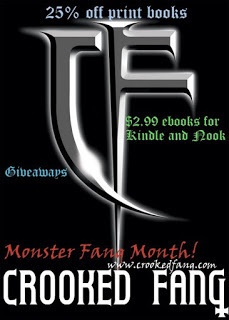 Because I'm so ridiculously proud of Crooked Fang, the novel by Carrie Clevenger for whom I played editor, I'm also happy to give a splash on my blog today to share the fact that she's running a special for the month of October. It's available in print and electronic formats.
Because I'm so ridiculously proud of Crooked Fang, the novel by Carrie Clevenger for whom I played editor, I'm also happy to give a splash on my blog today to share the fact that she's running a special for the month of October. It's available in print and electronic formats.If you have no idea who or what Crooked Fang is, it's a story featuring a vampire--one Xan Marcelles--and he's a total breath of fresh air in the genre.
But instead of me doing all the talking, I'm going to pull some quotes from happy readers off Goodreads.
"Xan is a completely lovable character, even when he's doing his best to screw things up. A breath of fresh air in a sea of stagnant vampire books! This book is not to be missed." ~ Synde
"Oh yay, another vampire, I hear you cry. Stop right there. Forget for a moment that Twilight ever existed, and give Crooked Fang a go. Why? Because sometimes you can almost forget that CF's hero, Xan Marcelles, is even a vampire. I prefer to think of him as a grumpy, whisky-drinking, chain-smoking bassist who's going to live for a really, really long time." ~ Icy Sedwick
"He’s a gritty, heady mix of biker/ musician hottie next door and badass vampire trying very hard to just stay off everyone’s radar. There will be no ruffled poet shirts here. Expect lots of whiskey and cigarettes, Harleys and muscle cars, and references to rock music that will span most of the history of rock. He’s also got a low tolerance threshold for bullshit, but that doesn’t stop him from ending up in it." ~ Suz
"There were a few scenes in Crooked Fang that absolutely set me back on my heels, scenes of such crystalline, short-leashed violence, such visceral power, that I felt my blood pressure rising and my breath catch in my throat. That doesn’t happen often with me and, when it does, I can’t help but shake my head in jealous admiration and say, 'damn, that’s some good writing.'" ~ Cathy Olliffe Webster
Well, what are you waiting for? This is, in my books, one of the best vampire stories to hit the shelves this year, and I'm the darndest luckiest editor to have seen this story and snatched it up. I don't think you're going to get this one as cheaply as it is right now. Ever again.
Published on October 01, 2012 11:22
September 27, 2012
JK Rowling, The Casual Vacancy -- on my desk!
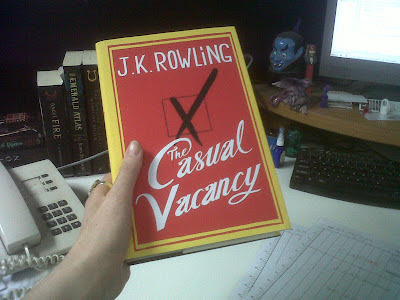 I'm very excited. Very, very excited. What I've always loved about JK Rowling's writing is her characterisation, and she tells a damn fine story. And I can't wait to get started.
I'm very excited. Very, very excited. What I've always loved about JK Rowling's writing is her characterisation, and she tells a damn fine story. And I can't wait to get started.
Published on September 27, 2012 01:41
September 26, 2012
Transformation by Rab Swannock Fulton #release
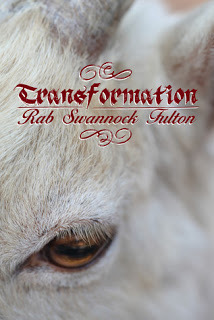
I was supposed to meet Rab Swannock Fulton last year while I was visiting Ireland. But we passed each other like ships in the night, and I wasn't in Galway long enough to make a new plan. He did, however, get a limited-run printed copy of his novel, Transformation, into my hands. When I read the novella, I was totally blown away by his lyrical style. What at first seemed like a sweet love story went so horribly wrong, in the nicest, wrongest possible ways. I just knew I wanted to sink my red pen into this story--and now, a year later, this has come to pass. I am, however, going to let Rab speak for himself, and he's graciously stopped by my blog for a little Q&A. Welcome, Rab!
You're a professional storyteller based in Ireland. Tell us how that came about, and also what the average day in the life of a storyteller is.
Well I’ve aye been surrounded by stories, from the moment I was born I was surrounded by people either telling tales or reading tales. This has been going on in my family for generations in one for or tother. At the moment I’m telling stories and my sister is writing plays, whilst one nephew is acting. So we’re all into words in some form. As for why I turned professional. Well I’d been through a terrible few years of grieving when a friend of mine Clare Murphy – a wonderful Irish storyteller – asked me to come tell some stories with her. This was in 2006. And things just developed from there.
My average day, at the moment, is spent juggling between editing riskybizzness.blogspot.ie and trying to get the Folk Tales book written. I’m lucky in that I start my week days walking my son to his school. It’s a walk that can last anywhere from 25 minutes to an hour, depending on what distractions we come across – flowers, squashed foxes, ufo landing sites, that kinda thing. All the time of course there are stories running through the back of my head as I prepare for my weekly show in The Cottage Bar. The shows take place every Thursday night and I’m usually wiped out on Friday – its been a gey busy summer, shows packed to capacity. And then there’s always other shows going on. This weekend I was entertaining a private group of travel writers and journalists from Quebec, so its all go.
Transformation starts out as a love story, but things go horribly wrong. Can you tell us a little more about the background of the tale?
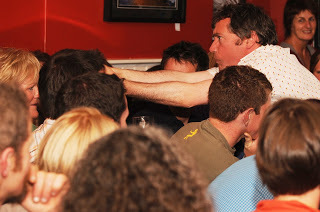 Rab doing what he does best! Telling stories.Well you know how it is as a writer, yir aye processing things. Whatever yi see goes in to your brain and begins turning into stuff. But what I wanted to capture with this tale was a sense of wonder, the wonder of soul, sex, terror. All that.
Rab doing what he does best! Telling stories.Well you know how it is as a writer, yir aye processing things. Whatever yi see goes in to your brain and begins turning into stuff. But what I wanted to capture with this tale was a sense of wonder, the wonder of soul, sex, terror. All that.Goats. These wonderful creatures are entrenched in Ireland's history. When I toured Ireland last year I saw a bunch of statues of goats here and there. Tell me more.
Goats go way back into Irish culture and identity and I use a little of that history in Transformation. They are definetly part of pre-Christian forms of engagement with life and the world. Funnily enough my Chinese star sign is the goat. And when I worked up in a farm in Leitrim there was a heap of goats there. The most delightful weird inquisitive creatures, with an old crabbit granny goat in charge of them all. So I guess I’ve aye had an affinity wae goats. I have another goat story, well a goat skin story, that I perform called Toby’s Wish, a lovely grotesque funny tale
What are some of your favourite stories that you tell to audiences?
It depends on the audience. But what I particularly love is listening to the stories that people bring into the audience. I have learnt so much about Galway just from older audience members telling me their family tales. And of course some of those tales touch on the stranger parts of Galway. I have met people, for example who have seen Hy Brazil.
Where can folks track you down for your sessions?
I’m lucky that locally and internationally word of mouth has served me very well. But the best way to keep up on my Celtic Tales show is keep an aye on the Celtic Tales page in my Marcus Marcus blog
Links:
Marcus Marcus & the Hurting Heart http://marcusmarcusthehurtingheart.blogspot.com
RiskyBizness http://riskybizzness.blogspot.ie/
Twitter http://twitter.com/haveringrab
Facebook https://www.facebook.com/rab.fulton
Published on September 26, 2012 14:32
September 24, 2012
Call for submissions: Bloody Parchment
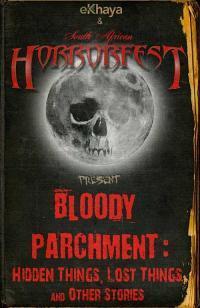 One of the projects that have successfully kept me out of much mischief over the past few years has been Bloody Parchment, an event and short story competition/anthology brought out under the auspices of the South African HorrorFest.
One of the projects that have successfully kept me out of much mischief over the past few years has been Bloody Parchment, an event and short story competition/anthology brought out under the auspices of the South African HorrorFest.This year we're once again being hosted by the Book Lounge, on October 26, and the brief that has gone out to the writers is "drabbles". If you don't know what a drabble is, then go read this... The evening looks to be fun, and I have some of South Africa's top genre fiction authors participating, including the likes of Sarah Lotz, Cat Hellisen and Louis Greenberg, among others. If you're a local author and would like to participate, mail me at nerinedorman@gmail.com
But the real reason I'm putting up this blog post is that I'd like to offer all aspiring and existing dark fantasy and horror authors a chance to be part of the Bloody Parchment short story competition. We're busy with the third one, and now have the backing of eKhaya, the digital imprint of Random House Struik. So yes, this is a big deal if you're looking to garner a publishing cred.
Our judges are all publishing professionals, either authors or editors, who have a love for dark fantasy and horror fiction, and if your story makes it into the list of finalists, it will be considered for the next anthology. But wait, there's more. The winner of the short story competition also receives a detailed assessment and round of content edits for a novella- or novel-length work.
VITAL DETAILS
What do you need to know? We're accepting short stories in the dark fantasy and horror genre of up to 3 500 words in length. The closing date is October 31, and if you need to know more, go check out the page on the Bloody Parchment blog or email me at nerinedorman@gmail.com
Published on September 24, 2012 02:45
September 21, 2012
Freeze Frame Reality, excerpt #FridayFlash
This is an excerpt from a work in progress entitled Freeze Frame Reality. It's not done yet, and it's [shock, gasp, horror] contemporary fiction with not one whiff of supernatural elements. I thought I'd share this today, as it's still a project I'll finish at some point.
* * * *
I don’t want to be here. I’ve parked beneath the willows outside the house where I grew up and the attrition is glaring—the way the once-cheerful blue paint on the shutters now sloughs off in uneven strips; how the banksia threatens to completely engulf the veranda; and the choking Paterson’s curse with its purple blooms and prickly grey-green foliage has swarmed what should have been my aunt’s rose bed. The place looks as if no one has lived here for ages, the inhabitants fled. In a sense they have. First my brother—off to college and now building houses he can’t afford to live in himself. And me, the prodigal niece, the failed photo-journalist, who’s spent the past ten years of her life photographing bereaved parents, old people evicted from homes and angry residents dissatisfied with substandard government housing. Always wading thigh deep through others’ grief. This is not how I imagined to come full circle.
If I tabulate what my life has amounted to up until this point, I have not achieved the things I set out to do and, like a kicked dog, I’ve whimpered back to the kennel. Only now I must be the strong one. And I don’t want this. The truth remains that there is no one for me, to enfold me in a motherly embrace and whisper that it’s all going to be okay. It’s not going to be okay. What’s worse is the knowledge that if I stop kicking, I’ll sink beneath the surface and the waves will cover me. I’ll be forgotten. No one will speak my name.
I don’t have anyone else to blame but myself.
The bleakness of my situation makes my eyes prickle and I suck in a deep breath. I can do this thing. Tim and I knew it was coming; knew one of us would end up returning. I just didn’t think it would be me. Aunt Emma’s old. There’s nothing for it. For almost six years I haven’t visited the woman who raised us. That particular brand of guilt bites hard but my limbs are leaden. Instead of getting out of the car to knock on the door, I breathe in and out. Deep, steadying breaths. I should have a cigarette but my mouth tastes grungy and my lungs have a disturbing gurgle when I cough. I smoke too much.
It’s only ten in the morning but it’s hot, and the cicadas scream in the stand of gum trees at end of the street. The sound is a shimmering curtain reminding me of long summer afternoons wanting to go play outside. It’s not the wisest of ideas to be out of doors here mid-summer but it’s early October now and already the morning sun has a nasty sting once I summon the courage to get out of the car.
The aluminium gate slams shut behind me—yet another memory, of the times I came home from school, happy to be here. Only now the clash of metal on metal has a ring of finality to it. There’s no turning back.
The black wrought-iron knocker is heavy in my grasp and the hollow thuds ring deep into the house. I try to imagine the place as it once was: cool dark passages with quarry tiles worn smooth after the passage of many feet; sepia portraits of long-deceased relatives keeping watch beneath hooded eyes. The old people in those photos used to fascinate and scare me to death by equal measure. Aunt Emma used to pick me up so I could see them better. She knew all their names and who was related to whom; what they did, where they lived and when they died. Their stories are mostly forgotten now, as faded as their prints. Their names are reduced to carved granite markers in cemeteries.
I’m ready to knock again when the door opens and I look down into the face of a middle-aged coloured woman almost two heads shorter than me, but at least four times as broad. Her powder blue tunic is embroidered with the Williams Trust logo.
“Hi, you must be Sara Veldman.” I hold out my hand.
She squints up at me then smiles, revealing teeth that are far too white or even to be anything but falsies. “Miss Owens! You look nothing like in the photos. Come in! Come in!” The photos...that no doubt depict me in various awkward adolescent poses. The only ones of me as an adult are scattered around assorted social networking sites. Thank God I look nothing like in those childhood photos. I used to have a penchant for cut-off denim shorts cut off a little too high. The horror.
Sara ushers me into the sitting room where I sink into the couch. The floral print upholstery looks far more frayed than the last time I was here. The scent of mothballs makes me wrinkle my nose.
The woman remains standing. “Can I get you anything, some lemonade, perhaps? We’ve got ice.”
“That would be lovely, thanks.”
I shouldn’t delay the inevitable but now that I’m down, I have no desire to go through to the master bedroom to greet Aunt Emma. I want to remember her as she was the last time I saw her—a somewhat dotty yet bubbly old lady. My dear brother hasn’t failed to rub my absence in my face.
“She’s deteriorating fast,” he likes to tell me. “You’d better go see her before she dies. She’s not going to be around forever, you know.”
We don’t talk about our mother, Aunt Emma’s sister, who left us on her doorstep when we were very small. We don’t discuss the father we can barely remember. Aunt Emma, as far as we know, is our only blood relative. The rest are either dead or live overseas—cousins we’ve never met and, in all likelihood never will.
Published on September 21, 2012 03:24
September 19, 2012
The Griffin's Flight by KJ Taylor #review
Title: The Griffin’s Flight (The Fallen Moon, Book 2)
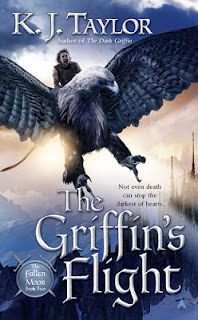 Author: KJ Taylor
Author: KJ TaylorPublisher: Ace, 2011
Buy link
Book two of the series has its ups and downs. I must admit I’m reading this series mainly because I ended up emotionally invested in the main characters, so kudos for KJ Taylor for engaging me in that sense. That being said, The Griffin’s Flight is not a smooth ride. Taylor compresses a fair amount of time in the first half of the novel, which tends to feel as though it drags.
We pick up with Arren on his flight north as he discovers the mysterious woman Skade. Like Arren, there’s more to Skade than meets the eye, which lends an interesting departure from the norm that might squick out some readers. Arren, as always, falls prey to his passions, which leads to all manner of ill fortune, and I can’t help but wonder how things would go if he were more honest. As a character he is infuriating, especially in the sense that he continues to lie to himself—and others. And it is these lies that create more issues than anything else.
Arren is a man at war with others’ perceptions of himself, and the fact that he appears to have found himself as an integral part of an ages-old curse. Much of what annoyed me about him in book one is still in evidence—he is a victim trapped by deeply entrenched prejudices. It’s how he deals with his predicament that I hope will improve by book three.
Erian, who should be the antagonist, becomes far more likeable in book two once we get to know him. Taylor pulls a very typically George RR Martin trick of getting us to relate to a character who *should* be the antagonist, then swinging the story around to show us the very same character from the point of view of *their* opponent. Nice tension building here, and I can see this story is going to head toward an almighty meltdown, as Taylor subverts reader loyalties.
I very much still have that love-hate relationship with KJ Taylor’s writing. There is one issue of a fact that was *very* important that the character knew. So important that I felt it should have been something that would have preyed on his mind from book one, but it only gets a passing mention in book two. I won’t mention what it is, but I howled in frustration when Taylor dropped that bomb. I’m certain this is a plot development that only cropped up in book two. The nature of the fact was such that it is a crux point in a character’s make-up, and to avoid all mention until now is a major WTF moment for me as a reader. My inner editor is crying out for her red pen.
But never mind. I still wanted to know what happened next, and as always Taylor produces a story that does not follow conventional paths. There’s the satisfying sense of anti-hero who’s going to have to fight really hard to escape his wyrd. Whether he succeeds is another matter, and I sense Taylor is an author who isn’t scared of letting her hero fail.
Book three should be interesting. And of course I’m compelled to read the next one in the series. I can’t help myself. For all the rough edges, KJ Taylor tells a mean story.
Published on September 19, 2012 12:37
September 17, 2012
Icy Sedgwick on Characters. #guest
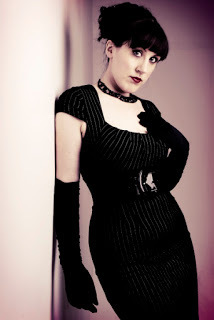 Today I welcome one of my good writing buddies, Icy Sedgwick. Some of you might already be familiar with her fiction from Friday Flash (and if you aren't, shame on you) but she's also got a Western novel out, entitled The Guns of Retribution. Thanks for stopping by, lady, and over to you...
Today I welcome one of my good writing buddies, Icy Sedgwick. Some of you might already be familiar with her fiction from Friday Flash (and if you aren't, shame on you) but she's also got a Western novel out, entitled The Guns of Retribution. Thanks for stopping by, lady, and over to you...* * * *
One of the questions I'm often asked is "How do you come up with your characters?" It's a tricky question because every character is different, and I don't follow a set formula to generating characters for various roles within a story. Having said that, having strong characters is a crucial part of a story's success, since these creations need to be able to carry your story - especially if you've chosen a first person viewpoint, and the character is essentially telling the story themselves.
I first had an idea to write a gunslinger several years ago. I never got any further than the opening lines of a story, but I knew I wanted to use him in some way. He got mothballed while other, more concrete, projects came along, and I didn't think about my gunslinger any more until the closing weeks of 2010.
I got an email asking if I'd like to write a story of revenge for submission to an independent press. I had several genres to choose from, and remembering my gunslinger, I chose the Western. Coming up with the basic plot was easy enough - Grey O'Donnell comes back to his hometown of Retribution, Arizona, after six years away, and has to confront an old bully, Jasper Roberts, who has risen to the position of sheriff. In the version of The Guns of Retribution that got published in September 2011, Grey is a bounty hunter. What a lot of people don't realise is he started out life as an outlaw.
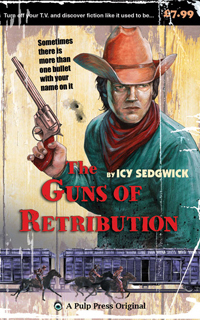 Grey O'Donnell was originally a train robber, but in the mould of Robin Hood. He'd never steal from anyone who didn't have enough they could afford to lose, and despite his illegal activities, he was a gentleman to everyone he encountered. His companions, the young and enthusiastic Billy Cole, and the stalwart Apache Mahko, were still there, but this time they comprised his 'gang'. About a third of the way into the story, Grey took me aside for a quiet word. He told me that three men weren't really enough to rob trains, and really, he wasn't cut out to be an outlaw. Couldn't he do something else instead?
Grey O'Donnell was originally a train robber, but in the mould of Robin Hood. He'd never steal from anyone who didn't have enough they could afford to lose, and despite his illegal activities, he was a gentleman to everyone he encountered. His companions, the young and enthusiastic Billy Cole, and the stalwart Apache Mahko, were still there, but this time they comprised his 'gang'. About a third of the way into the story, Grey took me aside for a quiet word. He told me that three men weren't really enough to rob trains, and really, he wasn't cut out to be an outlaw. Couldn't he do something else instead?I sat back and looked at his actions so far. He was very keen on a sense of "right" and "wrong", but he was no lawman, especially not going up against a crooked sheriff. Grey smirked and suggested the role of 'bounty hunter'. Thus his profession was changed, along with his reasons for being back in the vicinity of Retribution. After all, it never sat right that an outlaw would leave his hometown, and travel across the country, only to come back to his old stamping ground to continue his life of crime. A bounty hunter in pursuit of his next pay cheque wouldn't have as many misgivings.
Grey's occupation wasn't the only thing that changed. I started out writing in the first person, but in present tense, as Grey told the story as if it were happening now. Around the time his occupation changed, I switched the entire story into third person, past tense. It gave me more room to be more flamboyant with language. Grey still wasn't happy. This was his story, and he wanted to tell it...so it switched back to first person, albeit now in past tense. That's the version you can read now.
If I can take anything from this process, it's that a story will always evolve - indeed, it needs to, in order to function as a solid narrative. Your characters have valid opinions as to what needs to happen, and when, and if you listen to them, you can end up with something more organic than if you stuck rigidly to a plot outline generated on postcards and Post-It notes. Remember that what you start out with isn't always what you finish with - but that's a good thing.
* * * *
About the author:
Icy Sedgwick was born in the North East of England, and is based in Newcastle upon Tyne. She has been writing with a view to doing so professionally for over ten years, and has had several stories included in anthologies, including Short Stack and Eighty-Nine. She teaches graphic design and spends her non-writing time working on a PhD in Film Studies. Icy had her first book, a Western named The Guns of Retribution, published through Pulp Press in September 2011.
Icy's blog – http://blog.icysedgwick.com
Find her on Twitter @icypop
Facebook – https://www.facebook.com/miss.icy.sedgwick
Goodreads – http://www.goodreads.com/Icy_Sedgwick
Buy The Guns of Retribution – http://www.amazon.com/dp/1908544007/
Published on September 17, 2012 11:17



